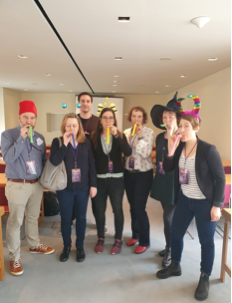PIDapalooza -- Not Your Average Information Event

The fourth annual PIDapalooza festival for persistent identifiers (PIDs) took place in Lisbon, Portugal, on January 29-30, 2020. Modeled after a music festival, this year’s event featured a Portuguese classical guitarist, a Japanese nail artist, quizzes (including one on NISO Principles of Identification, see below!) and other fun interactive sessions, an interpretive dance about the scientific process, an impromptu game of beachball, silly hats and whistles (as modeled by our Executive Director, Todd Carpenter, on the far left of top photo), the latest version of the fabulous PIDapalooza playlist and, of course, the lighting of the eternal flame!
In a slightly more traditional vein, there were also three thought-provoking and informative keynotes. First up was Maria Fernanda Rollo, Associate Professor, Universidade Nova de Lisboa, Faculdade de Ciências Sociais e Humanas. Her talk, Towards the Circular Science: PIDs for a New Generation of Knowledge Creation and Management Paradigm in Portugal — from Vision to Reality, focused on her experience as Portugal’s former Secretary of State for Science, Technology, and Higher Education. As the person responsible for developing their national strategy for open science, Maria’s priority was more science, less bureaucracy — not as simple as it sounds! Democratization, efficiency, and transparency were key to the Portuguese PID policy, which included developing Estudante IDs for students and Ciencia IDs for everyone involved in science.
The second keynote was Beth Plale, a program officer at the US National Science Foundation, working on open science, and a Professor in the Department of Intelligent Systems Engineering at Indiana University – Bloomington. Like Maria, she both highlighted the benefits and the challenges of open science, but her focus was primarily on data. She encouraged us to think about treating different kinds of digital content differently — for example, suggesting that not all data needs to be kept forever. And she noted that although “there’s a [PID] brain trust in this room,” most people don’t understand and/or care about identifiers; there’s a lot of work to be done on that front!
Last, but very definitely not least, was our closing keynote, Kathryn Kaiser, Assistant Professor and Scientist in the Office of Energetics at the University of Alabama – Birmingham. Her talk was entitled Dancing with the Scientists: The Costs of Piddling with Science without PIDs. In a festival-inspired mix of music, animation, and dance (yes, that’s where the interpretive dance came in — and the beachball!), not to mention some memorable analogies — cheese as a metaphor for metadata, fishing as a metaphor for systematic reviews — Kathryn shared her pain, her struggles, her data, and her hopes as a researcher who does a lot of systematic review work in nutrition and obesity topics.
NISO was closely involved in PIDapalooza, with Todd on the program committee and me on the organizing committee (originally with my ORCID hat on), so it was great to see months of planning come together so successfully. #PIDapalooza2020 was the best attended ever, with about 175 participants from around the globe and, when we asked people whether we had rocked their world this year, the answer was a resounding “Hell, yeah!”
Todd also led a very well-attended session on ISO’s Principles of Identification (ISO DTR 22943). Not the most exciting of topics, you might think … But you’d be wrong! After a brief introduction to NISO’s work, we moved onto a pub-style quiz about the Principles, with enthusiastic audience participation, including a little heckling, arguing over the answers — and prizes for the lucky winners! The top scorer, with an impressive 16 points out of a possible 18, was Anders Sparre Conrad at DEiC (Denmark), who won a half bottle of 20-year-old vintage port, with runners-up also receiving (lesser!) bottles. Want to see how you’d do? You can, because Todd’s slides, with all the questions and answers, are freely available on the PIDapalooza portal on Zenodo. So, even if you were unable to attend yourself, you can check out what was covered — and maybe we’ll see you at next year’s PIDapalooza (date and location still TBD)!